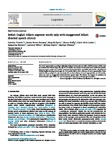British English infants segment words only with exaggerated infant-directed speech stimuli
| dc.contributor.author | Floccia, C | |
| dc.contributor.author | Keren-Portnoy, T | |
| dc.contributor.author | DePaolis, R | |
| dc.contributor.author | Duffy, H | |
| dc.contributor.author | Delle Luche, C | |
| dc.contributor.author | Durrant, S | |
| dc.contributor.author | White, L | |
| dc.contributor.author | Goslin, J | |
| dc.contributor.author | Vihman, M | |
| dc.date.accessioned | 2017-09-18T12:54:33Z | |
| dc.date.available | 2017-09-18T12:54:33Z | |
| dc.date.issued | 2016-03 | |
| dc.identifier.issn | 0010-0277 | |
| dc.identifier.issn | 1873-7838 | |
| dc.identifier.uri | http://hdl.handle.net/10026.1/9943 | |
| dc.description.abstract |
The word segmentation paradigm originally designed by Jusczyk and Aslin (1995) has been widely used to examine how infants from the age of 7.5 months can extract novel words from continuous speech. Here we report a series of 13 studies conducted independently in two British laboratories, showing that British English-learning infants aged 8-10.5 months fail to show evidence of word segmentation when tested in this paradigm. In only one study did we find evidence of word segmentation at 10.5 months, when we used an exaggerated infant-directed speech style. We discuss the impact of variations in infant-directed style within and across languages in the course of language acquisition. | |
| dc.format.extent | 1-9 | |
| dc.format.medium | Print-Electronic | |
| dc.language | en | |
| dc.language.iso | eng | |
| dc.publisher | Elsevier BV | |
| dc.subject | Word segmentation | |
| dc.subject | Infants | |
| dc.subject | Infant-directed-speech | |
| dc.subject | Replication | |
| dc.subject | British English | |
| dc.title | British English infants segment words only with exaggerated infant-directed speech stimuli | |
| dc.type | journal-article | |
| dc.type | Article | |
| plymouth.author-url | https://www.ncbi.nlm.nih.gov/pubmed/26707426 | |
| plymouth.volume | 148 | |
| plymouth.publication-status | Published | |
| plymouth.journal | Cognition | |
| dc.identifier.doi | 10.1016/j.cognition.2015.12.004 | |
| plymouth.organisational-group | /Plymouth | |
| plymouth.organisational-group | /Plymouth/Faculty of Health | |
| plymouth.organisational-group | /Plymouth/Faculty of Health/School of Psychology | |
| plymouth.organisational-group | /Plymouth/REF 2021 Researchers by UoA | |
| plymouth.organisational-group | /Plymouth/REF 2021 Researchers by UoA/UoA04 Psychology, Psychiatry and Neuroscience | |
| plymouth.organisational-group | /Plymouth/REF 2021 Researchers by UoA/UoA04 Psychology, Psychiatry and Neuroscience/UoA04 Psychology, Psychiatry and Neuroscience MANUAL | |
| plymouth.organisational-group | /Plymouth/REF 2021 Researchers by UoA/UoA04 Psychology, Psychiatry and Neuroscience/UoA04 REF peer reviewers | |
| plymouth.organisational-group | /Plymouth/Research Groups | |
| plymouth.organisational-group | /Plymouth/Research Groups/Centre for Brain, Cognition and Behaviour (CBCB) | |
| plymouth.organisational-group | /Plymouth/Research Groups/Centre for Brain, Cognition and Behaviour (CBCB)/Brain | |
| plymouth.organisational-group | /Plymouth/Research Groups/Centre for Brain, Cognition and Behaviour (CBCB)/Cognition | |
| plymouth.organisational-group | /Plymouth/Research Groups/Plymouth Institute of Health and Care Research (PIHR) | |
| plymouth.organisational-group | /Plymouth/Users by role | |
| plymouth.organisational-group | /Plymouth/Users by role/Academics | |
| dc.publisher.place | Netherlands | |
| dcterms.dateAccepted | 2015-12-11 | |
| dc.identifier.eissn | 1873-7838 | |
| dc.rights.embargoperiod | No embargo | |
| rioxxterms.funder | Economic and Social Research Council | |
| rioxxterms.identifier.project | Phonological representations in bidialectal listeners | |
| rioxxterms.versionofrecord | 10.1016/j.cognition.2015.12.004 | |
| rioxxterms.licenseref.uri | http://www.rioxx.net/licenses/all-rights-reserved | |
| rioxxterms.licenseref.startdate | 2016-03 | |
| rioxxterms.type | Journal Article/Review | |
| plymouth.funder | Phonological representations in bidialectal listeners::Economic and Social Research Council |


